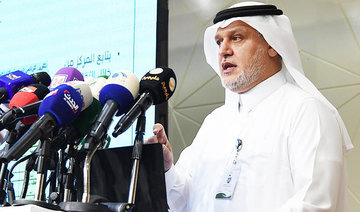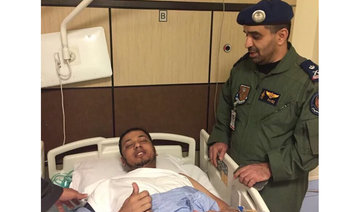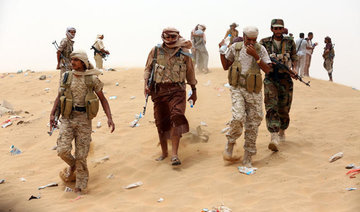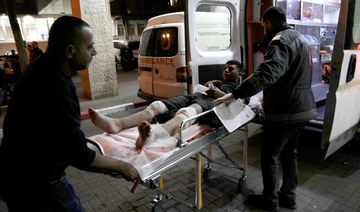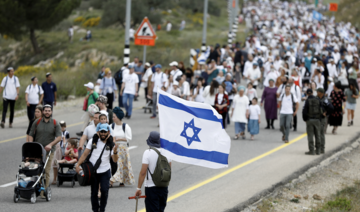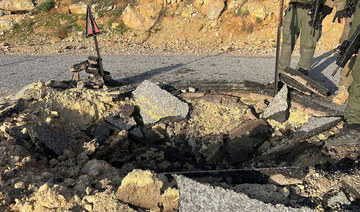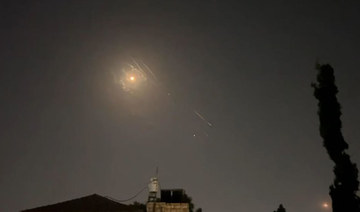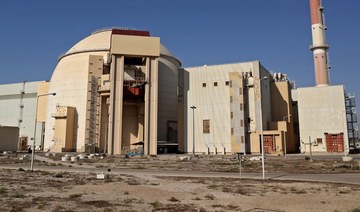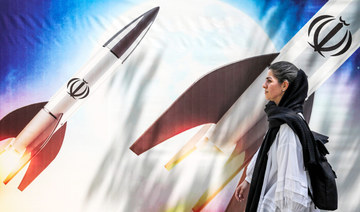CAIRO: Family members and a detainee say Yemeni security forces this week opened fire on detainees in the southern port city of Aden, wounding 12.
According to the detainee and two family members visiting their jailed kin, the incident took place on Sunday in the Beir Ahmed 2 detention center. The facility is part of an anti-terror campaign which set up a network of secret prisons to hold hundreds of terror detainees.
The detainee, one of the 12 wounded, told The Associated Press on Wednesday that the soldiers opened fire to halt a protest by the detainees against restrictions on closer contact with visitors.
Both the detainee and the relatives spoke on condition of anonymity because they fear retribution from prison authorities.
Security forces open fire on Yemen detainees, wounding 12
Security forces open fire on Yemen detainees, wounding 12
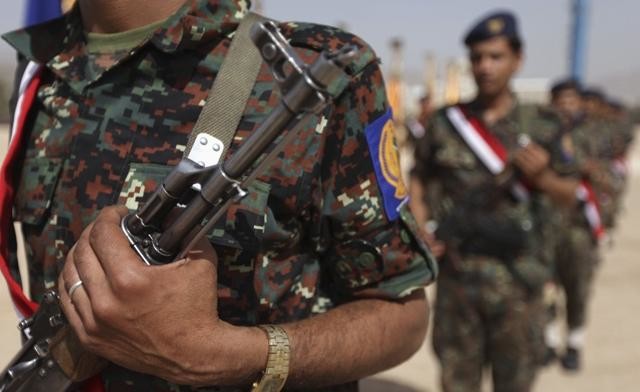
Arab League condemns surge in West Bank settler attacks
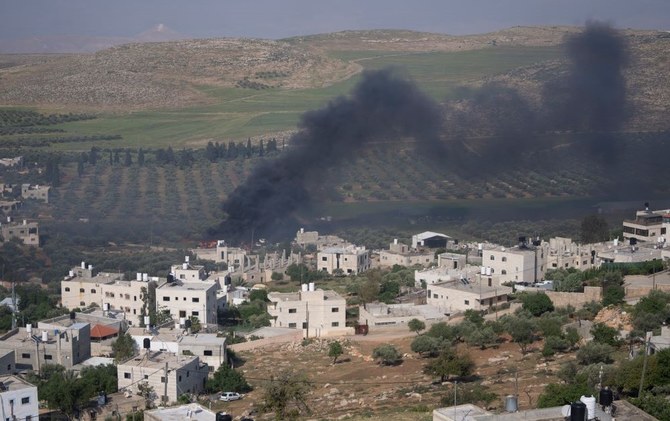
- Gamal Roshdy: Incidents of violent crimes, arson and property destruction perpetrated by armed settlers have seen a noticeable surge
- Tensions in the West Bank have been especially high since the outbreak of the Israel-Hamas war in the Gaza Strip on Oct. 7
CAIRO: The Arab League on Tuesday strongly denounced relentless attacks carried out by Israeli settlers on Palestinian cities and towns across the West Bank.
“These attacks, often perpetrated under the tacit approval and protection of Israeli authorities, are exacerbating a pervasive state of impunity and continued oppression of Palestinian lives and properties,” the league said in a statement.
Gamal Roshdy, the secretary-general’s spokesperson, said that while daily atrocities committed by Israeli forces in Gaza demand attention, they must not overshadow the escalating violence in the West Bank.
He added: “Incidents of violent crimes, arson and property destruction perpetrated by armed settlers have seen a noticeable surge, facilitated by a settler-led government that shields them from accountability.”
Roshdy warned that the imposition of sanctions by some countries on settlers, though a belated gesture, falls short of addressing the escalating crisis and safeguarding Palestinian civilians in the West Bank.
He called for action from the UN Security Council to end the “shameful cycle and the culture of impunity prevailing in the West Bank,” and to “hold these settlers accountable for their reprehensible crimes against the Palestinian people.”
Tensions in the West Bank have been especially high since the outbreak of the Israel-Hamas war in the Gaza Strip on Oct. 7.
On Friday, dozens of Israeli settlers stormed a Palestinian village in the Israeli-occupied West Bank, shooting at and burning houses and cars.
The Palestinian Foreign Ministry has strongly condemned the settler violations and crimes against Palestinians across the West Bank.
King Abdullah II: Jordan won’t become ‘theatre of war’ between Israel and Iran
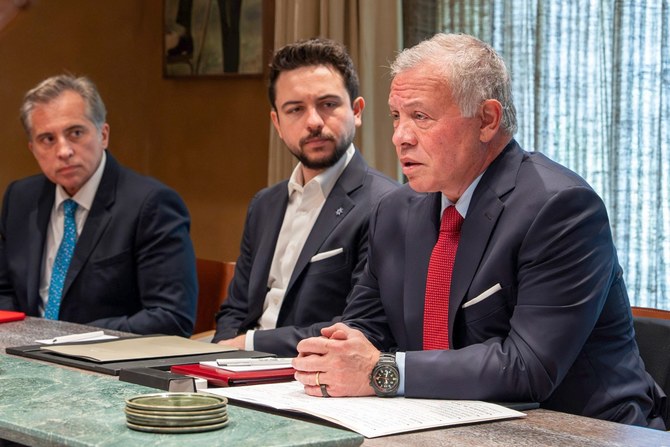
- King of Jordan reinforced the nation's commitment to upholding its security and sovereignty
- He said Jordan's aim was to safeguard its own sovereignty rather than defend Israel
DUBAI: Jordanian King Abdullah II said Tuesday that his country must not become ‘the theatre of a regional war’ after Jordan intercepted multiple missiles and drones when Iran attacked Israel at the weekend.
The king reinforced the nation's commitment to upholding its security and sovereignty above all other considerations. He stressed Jordan's aim was to safeguard its own sovereignty rather than defend Israel.
Last weekend, Jordan was among a group of nations that helped Israel shoot down missiles, rockets and attack drones launched by Iran and its allies at Israel.
Earlier on Tuesday, Jordan's Foreign Minister Ayman Safadi said the international community should stop Israeli Prime Minister Benjamin Netanyahu from "stealing" attention away from Gaza by escalating his confrontation with Iran.
In remarks during a press conference with his German counterpart in Berlin, Safadi said Iran had responded to the attack against its consulate and had announced that it did "did not want to escalate further".
"We are against escalating. Netanyahu wants to draw attention away from Gaza and focus on his confrontation with Iran," Safadi added.
Iran's weekend attack caused modest damage in Israel and wounded a 7-year-old girl. Most missiles and drones were shot down by Israel's Iron Dome defence system and with help from the US, Britain, France and Jordan.
Iran -- which labelled its attack an act of self-defence after a deadly Israeli strike on its Syria consulate -- warned Jordan it could be “the next target”, a military source was reported as saying by Iran's Fars news agency.
(with agencies)
Israel’s old Lebanese allies grapple with new Hezbollah threat
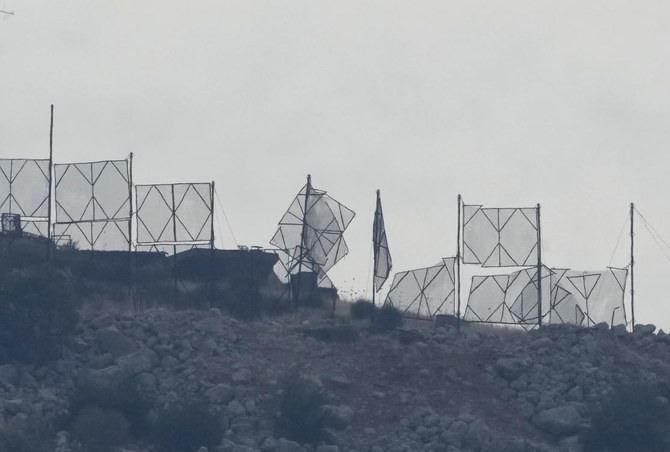
- The South Lebanon Army was a mostly Christian militia recruited by Israel when it occupied south Lebanon in the 1980s and 1990s
The looming threat of a war between Israel and Hezbollah in Lebanon is reviving painful memories for former Lebanese militiamen and their families who fled to Israel, their erstwhile ally, more than 20 years ago.
The South Lebanon Army was a mostly Christian militia recruited by Israel when it occupied south Lebanon in the 1980s and 1990s.
The Zadalnikim, as the SLA’s former members are known in Israel from the group’s Hebrew acronym, sought shelter south of the border in the aftermath of Israel’s sudden withdrawal from Lebanon in May 2000, fearing reprisals from Hezbollah, whom they had fought for years in a brutal and uncompromising conflict.
Iran-backed Hezbollah — a Hamas ally with a large arsenal of rockets and missiles — has exchanged fire with Israeli forces almost daily since Hamas attacked Israel on October 7 triggering war in Gaza.
In response, Israel has carried out strikes deeper and deeper into Lebanese territory, targeting several Hezbollah commanders.
A strip several kilometers (miles) wide on either side of the border has become a de facto war zone, emptied of its tens of thousands of civilian residents.
“They told us to prepare for two weeks in a hotel in Tiberias” in northern Israel, said Claude Ibrahim, one of Israel’s more prominent Lebanese collaborators.
“It’s already been six months. I hope it won’t last 24 years,” he told AFP, referring to his exile from Lebanon.
Ibrahim, a former right-hand man of the late SLA commander Antoine Lahad, was evacuated from the northern Israeli town of Kiryat Shmona, near the Lebanese border, in October when the entire city was emptied.
“It’s as if history repeated itself... generation after generation,” he said, referring to how the Zadalnikim had to flee their homeland after years spent moving from village to village during the Lebanese civil war of the 1970s and 1980s.
Of the 6,000 to 7,000 Lebanese who fled to Israel in May 2000, around 3,500 still live in Israel, according to the authorities. They are registered with the interior ministry as “Lebanese of Israel” and were granted citizenship in 2004.
Shortly after their arrival in Israel — where authorities only partly took responsibility for them — many moved on to Sweden, Germany or Canada. Others returned to Lebanon, where they were tried for collaboration with Israel.
All former SLA members in Israel have relatives in Lebanon, mostly in villages in the south, a few kilometers (miles) from the Israeli border.
Few agreed to be interviewed out of fear of reprisals against their families in Lebanon, whom they stay in touch with via third parties for the same reason.
Maryam Younnes, a 28-year-old communications student at Bar-Ilan University near Tel Aviv, was five when she arrived in Israel with her parents.
When her father, a former SLA officer, died a decade ago, they were able to bury him in their ancestral village of Debel, roughly 10 kilometers (six miles) as the crow flies from Ma’alot-Tarshiha, the northern Israeli town they moved to.
The rest of their family remained in Lebanon, in Debel and the capital Beirut.
With fears growing that the near-daily exchanges of fire across the border might escalate into a full-scale war, Younnes was worried about her relatives.
“I’m very concerned for my family, for my village (in Lebanon),” said Younnes, who sees herself as “half Lebanese, half Israeli.”
“I hope that there will be a way to protect them,” she said, if there is an all-out war with Hezbollah.
Ibrahim was equally worried, although he voiced hope that a new conflict with Israel would “finish off” his old enemy Hezbollah.
“The only solution is a big strike on Hezbollah so that it understands that there is no way forward but through peace,” he said.
Ibrahim said there was no reason Israel and Lebanon should not be at peace.
But Asher Kaufman, a history professor at Notre Dame University in Indiana who specializes in Lebanon and the wider Middle East, said attitudes in Israel had shifted significantly in the decades since the civil war and the cooperation between Lebanese Christian militias and the Israeli military.
The vision of an alliance between “Lebanese Christians and the Israelis, which was at the root of the 1982 invasion (of Lebanon by Israel) has completely collapsed.”
Israel has stopped “viewing Lebanon as the Switzerland of the Middle East,” a peaceful and prosperous country, and now sees it as “a violent quagmire it wants nothing to do with.”
Israeli forces must halt ‘active participation’ in settler attacks on Palestinians: UN
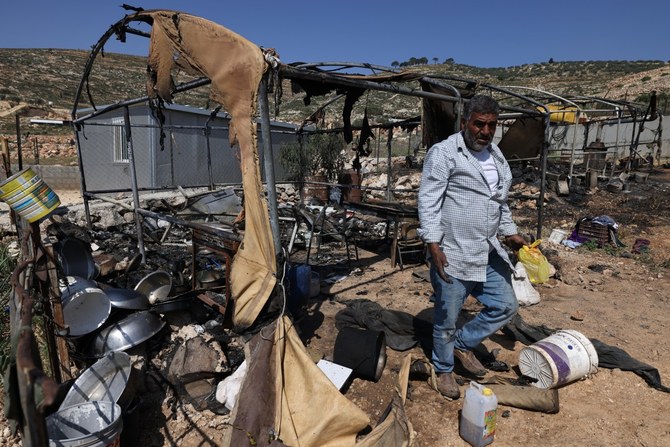
- Israel is still imposing “unlawful” restrictions on humanitarian relief for Gaz
Geneva: The UN voiced grave concern Tuesday over escalating violence in the West Bank, demanding that Israeli security forces “immediately end their active participation in and support for settler attacks” on Palestinians there.
“Israeli authorities must instead prevent further attacks, including by bringing those responsible to account,” Ravina Shamdasani, spokeswoman for the United Nations rights office, told reporters in Geneva.
Israel is still imposing “unlawful” restrictions on humanitarian relief for Gaza, the UN rights office said on Tuesday. “Israel continues to impose unlawful restrictions on the entry and distribution of humanitarian assistance, and to carry out widespread destruction of civilian infrastructure,” said Ravina Shamdasani, spokesperson for the UN human rights office, at a press briefing in Geneva.
Heavy rains lash UAE and surrounding nations as the death toll in Oman flooding rises to 18
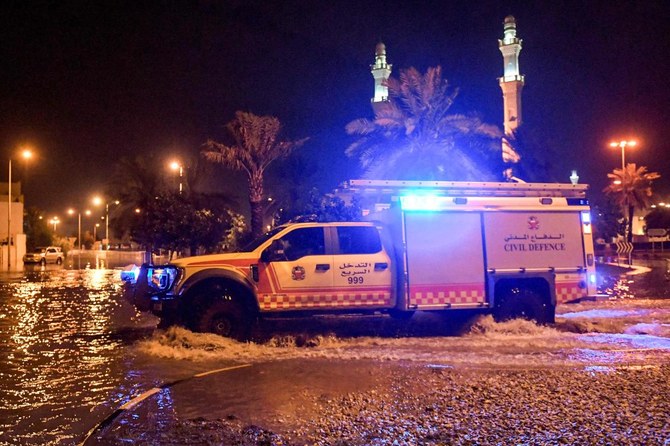
- Lightning flashed across the sky, occasionally touching the tip of the Burj Khalifa, the world's tallest building
DUBAI: Heavy rains lashed the United Arab Emirates on Tuesday, flooding out portions of major highways and leaving vehicles abandoned on roadways across Dubai. Meanwhile, the death toll in separate heavy flooding in neighboring Oman rose to 18 with others still missing as the sultanate prepared for the storm.
The rains began overnight, leaving massive ponds on streets as whipping winds disrupted flights at Dubai International Airport, the world's busiest for international travel and the home of the long-haul carrier Emirates.
Police and emergency personnel drove slowly through the flooded streets, their emergency lights flashing across the darkened morning. Lightning flashed across the sky, occasionally touching the tip of the Burj Khalifa, the world's tallest building.
Schools across the UAE, a federation of seven sheikhdoms, largely shut ahead of the storm and government employees were largely working remotely if able. Many workers stayed home as well, though some ventured out, with the unfortunate stalling out their vehicles in deeper-than-expected water covering some roads.
Authorities sent tanker trucks out into the streets and highways to pump away the water.
Rain is unusual in the UAE, an arid, Arabian Peninsula nation, but occurs periodically during the cooler winter months. Many roads and other areas lack drainage given the lack of regular rainfall, causing flooding.
Initial estimates suggested over 30 millimeters (1 inch) of rain fell over the morning in Dubai, with as much as 128 mm (5 inches) of rain expected throughout the day.
Rain also fell in Bahrain, Qatar and Saudi Arabia.
In neighboring Oman, a sultanate that rests on the eastern edge of the Arabian Peninsula, at least 18 people had been killed in heavy rains in recent days, according to a statement Tuesday from the country's National Committee for Emergency Management. That includes some 10 schoolchildren swept away in a vehicle with an adult, which saw condolences come into the country from rulers across the region.


